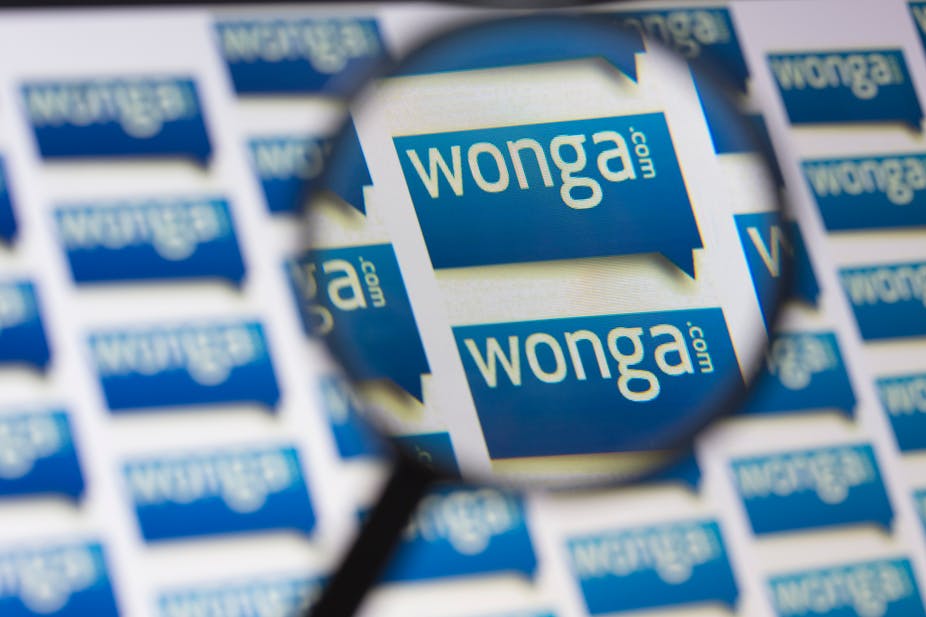Wonga, the poster-boy of the British payday lending industry, has gone into administration following an influx of customer compensation claims. Its demise is a result of government regulation to reform the payday loans sector in favour of the consumer.
A price cap that was introduced by the Financial Conduct Authority (FCA) regulator in 2015 on high-cost, short-term credit means that Wonga and other payday lenders’ history of irresponsible lending is catching up with them. Profits have been eaten into as a result of the cap, with Wonga having to foot the bill for a large number of compensation claims for loans taken out before the regulation was introduced. It is likely that as a result of the FCA’s ongoing reforms, other high-cost lenders will also collapse.
The experiences of payday loan applicants gives a sense of how significant this is. On the one hand they include people who are in desperate need of credit – often to pay for bills. But, on the other, this leaves them vulnerable to paying a poverty premium.
Wonga’s rise
The rise of payday lending came about in the wake of the 2008 financial crash, which brought many households personal financial crises of their own. Household budgets across the board have been squeezed due to rising costs and wage freezes, with many now worse off than before the great recession.
One way to bridge the gap between income and outgoings is by using credit. For many, this means using mainstream bank finance in the form of overdrafts, loans, or credit cards. But a growing number of households are unable to access mainstream bank finance and are excluded from mainstream options as a result of a low credit score or insecure employment.

High-cost credit in all its different forms (payday loans, home-collected credit, rent-to-buy, log-book loans) operates as an alternative credit market for those excluded from mainstream finance. Payday loans – and Wonga especially – were extremely popular due to the anonymity and ease of applying online and fast access to cash. But huge interest rates led to many paying dearly for this easy access to credit.
The new FCA regulation stopped some of the worst excesses. But, to remain competitive alongside the new regulation, payday lenders changed their operations and innovated new products. For example, some payday loan products have longer repayments terms. This, however, means that the loan is more expensive overall, even though repayments are more affordable.
People’s experiences
Alongside Carl Packmam (then at Toynbee Hall and now the Fair by Design campaign against the poverty premium), I undertook in-depth research with former payday loan takers who then self-identified as “declined applicants” as a result of the regulation. What we found was different to the FCA’s 2017 report which said that the majority of former users of payday loans (63%) that have since become a “declined applicant” as a result of the regulation “believe that they are better off as a result”. The FCA’s research indicated that 60% of “declined applicants” do not borrow from other sources and have not turned to other forms of high-cost credit or illegal money lenders.
Our interviews with 80 people who had been declined from a payday loan since the regulation was introduced suggest a more nuanced picture. Talking to people face-to-face, we went more in depth than the FCA’s consumer survey and we found that people took a series of actions. They sought access to other credit after being declined, such as applying to another lender, friends and family. Some tried to avoid borrowing, such as by going without credit or increasing their working hours.
The most common step that people took after being declined was to access money from friends and family. The second was to apply for some other kind of formal credit product. Many of our interviewees were successful in accessing a payday loan from another company after being declined one first. This suggests that some lenders are not adhering to responsible lending or the high-cost, short-term credit regulation and that the “declined applicant” status was temporary for some. Only four people borrowed from an ethical community finance lender (such as credit union or Community Development Finance Institution) and one used a credit card.
This signals to us that more borrowing options were preferable for declined applicants than managing in other ways. Or because the money was needed for essential items such as rent and utilities. This potentially strengthens the case for better and more affordable borrowing options for those now declined a payday loan.
We know credit is not always the solution to all borrower’s problems, but we also know that more affordable credit options would provide a lifeline for many people today who feel their only option is to use very expensive credit products. While the cap on the cost of payday loans has largely had the intended effect of increasing rules around what kind of borrower (and in what kind of situation) can manage using a payday loan with few risks of causing negative financial outcomes, there still needs to be a greater supply of alternative credit products available to fill that demand.

